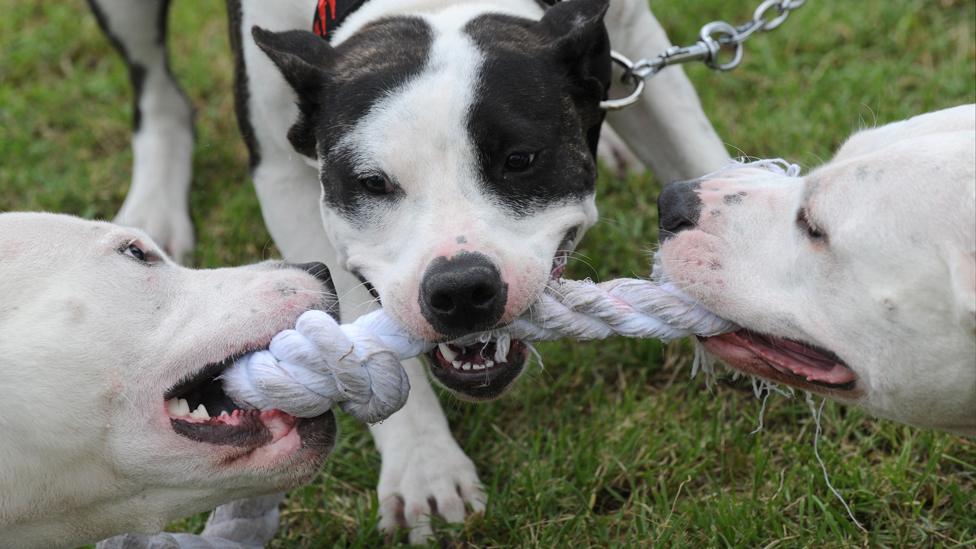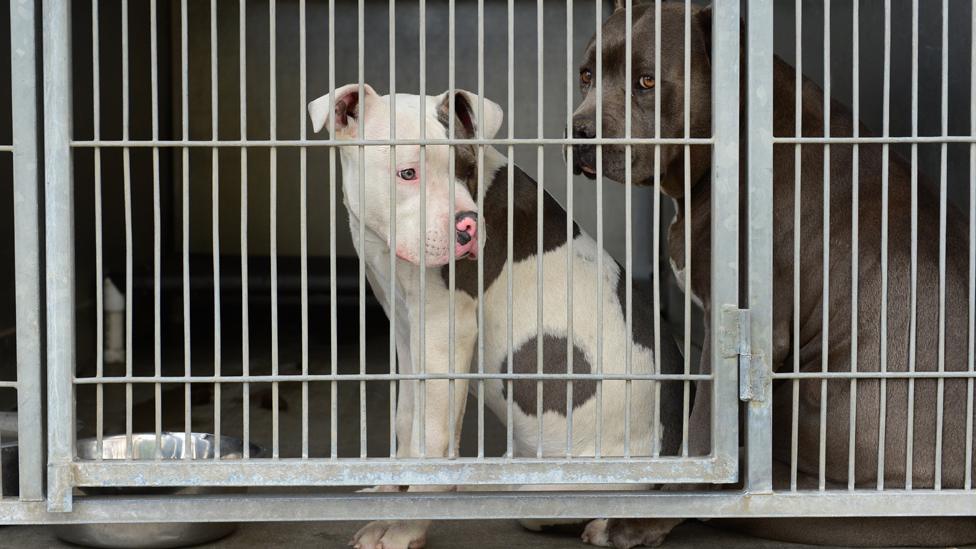Montreal pitbull ban put on hold
- Published

A Quebec judge has placed a temporary pause on Montreal's controversial pitbull ban.
The ban is now on hold until Wednesday.
It was passed by the city council last week and came into effect on Monday amid an outcry by animal welfare groups and threats to boycott the city over the law.
The delay is a short-term win for the Montreal Society for the Prevention of Cruelty to Animals, which is challenging the city in court over the new animal control by-law.
The SPCA is seeking a longer-term suspension from the Quebec Superior Court during which they plan to challenge the legality of the new by-law.
Alanna Devine, director of animal advocacy at the organisation, called the rules "draconian".
'We're simply not going to participate in a by-law we feel is not legal in terms of violating people's fundamental rights and basic principles of administrative law," she said.
She argued that among its issues, the ban defines pitbull breeds too broadly and will be too expensive for some dog owners who want to comply with the new rules.
The Quebec Order of Veterinarians and other animal welfare groups are supporting the SPCA's opposition. Opponents of the ban have also received support from US-based pitbull advocates and celebrities like actress and animal rights activist Pamela Anderson and singer Cyndi Lauper.
Pitbull ban supporters say the breed is uniquely dangerous and point to studies suggesting attacks by pitbulls and their closest relatives outnumber those of other breeds, as well as more likely to severely injure or kill the victim.
Montreal's push for a city-wide ban came in the wake of a fatal dog mauling last June in Pointe-aux-Trembles, a suburban community in Montreal's east-end, and the subsequent pressure from the victim's family to crackdown on aggressive dogs. Quebec is also considering a province-wide ban.
In the attack, 55-year-old Christiane Vadnais was mauled to death in her backyard by a neighbour's dog.

Montreal Mayor Denis Coderre voted in favour of the bill
Farid Benzenati, who witnessed some of the mauling, told the Montreal Gazette he first thought the dog was playing with a toy.
"As I got closer I saw, I distinguished a body, the body of a woman, because I saw her hair," he said. "It was horrible."
Police had to shoot and kill the dog before paramedics could approach Ms Vadnais' body. She was declared dead on the scene.
Under the new by-law, new ownership of pitbulls is banned. Existing pitbulls have to be licensed by the end of the year.
By 31 March 2017, the dogs must be sterilised, micro-chipped and vaccinated. They must also be kept on a short leash and muzzled in public. Pitbull owners must undergo a criminal background check.
Montreal is not the first jurisdiction in Canada to implement a breed-specific ban.
The city of Winnipeg implemented a similar ban in 1990, and Ontario in 2005. A number of other smaller jurisdictions across the country also have so-called breed-specific legislation (BSL).
According to statistics compiled by DogsBite.org, a US charity that supports such bans, 36 US states and 41 countries worldwide have some form of BSL on the books, from mandatory sterilisation to outright bans on pitbulls and some other breeds.
Still, the laws are fiercely opposed by animal advocates in North America. Animal Alliance of Canada's Liz White argues it makes no sense to ban an entire breed over a few aggressive dogs.
"It's like taking a sledgehammer to a pea," she said.

In Toronto, where her organisation is based, Ms White said the ban has simply served to drive pitbull owners underground. Only about 30% of dogs in Toronto are licensed, according to Toronto Animal Services.
"We know they (pitbulls) are in Toronto because they end up in shelters," Ms White said.
And results of the decade-old ban are not conclusive. Data provided by the city show dog bites increased by 24% between 2014 and 2015.
Javier Schwersensky, chief executive of the Winnipeg Humane Society, admitted it was difficult to measure the impact of the city's 25-year-old pitbull ban on reducing the dangers caused by aggressive dogs.
"There will never be an agreement about the benefit or not of breed specific legislation. You will never get to the point of 100% conclusive evidence," he said.
"It's really about public sentiment, at the end of the day, how the public feels."
Meanwhile, the dog that killed Ms Vadnais might not in fact have been a pitbull.
Montreal police are still waiting for the results of a DNA test to confirm its breed.
- Published20 September 2016

- Published13 April 2016
